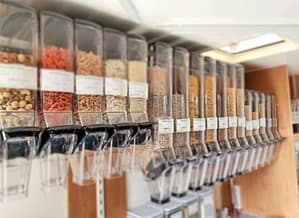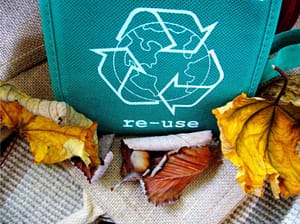Green shopping tips are easy to incorporate into our shopping processes and habits. When shopping, it is becoming more popular to put the environment into consideration, which is a good societal development. The use of plastic shopping bags is the main order of the day, and this contributes to the plastics we see everywhere.
Plastics are lying on the road by those who do not observe street cleanliness, plastic bags are in the hands of people shopping, and all these contribute to filling up dump sites especially when the plastic is not recycled.
These products, which are non-degradable, then find a way to pollute the environment and thereby contribute to global waste problems.
To make our planet safer, here are helpful eco-friendly shopping tips for your next shopping:
1. Buy in bulk

Buying in bulk helps greatly in reducing the amount of packaging we need for each item. It helps us in reducing our carbon footprint because the transportation of food is less. Moreover, it saves time and money. On the other hand, buy only the necessary items in your bulk shopping to avoid wastage.
2. Buy local and seasonal products:

1. You’re reducing your carbon footprint. Produce that has to be shipped long distances has a much larger carbon footprint than produce that is grown locally. Read our article Develop Energy Saving Routines for an in-depth overview on how to save energy.
2. You’re reducing packaging waste. Much of the produce that is shipped long distances comes in plastic packaging, which is harmful to the environment.
3. You’re helping to preserve our natural resources. Producing food locally uses less energy than producing food elsewhere, so it helps reduce greenhouse gas emissions.
4. You’re supporting your local economy. When you buy local, your money stays in your community, helping to support local businesses and farmers.
5. No preservatives are required to be sprayed on local , non-shipped products.
6. Buying local foods helps us to buy fresh food that has not gone through processing. This makes us have lesser worries over nutritional balance in meal planning because we know that our nutrients are intact.
3. Shop with your containers or bags:

Americans use 100 billion (yes , with a ‘b’) plastic bags per year. That is 365 plastic bags per person per year. Comparatively, Denmark citizens use 4 plastic bags per year. (BiologicalDiversity.org) . Visit this link for some sobering facts about plastic and shopping. We need to change our reliance on plastic bags, I’m sure you’ll agree!
4. Buy from second-hand stores:

When you buy products that have been used before, you’re helping the environment in a few ways. For one, you’re reducing the number of new items that need to be manufactured, which takes energy and resources. Additionally, buying pre-owned items means you don’t have to use as many packing materials for shipping, and it eliminates the waste associated with sending those products to a landfill. Finally, purchasing secondhand goods keeps these items out of the recycling stream and conserves valuable resources.
5. Buy reusable products:

There are many different types of reusable products on the market today. Some of the most popular include reusable water bottles, shopping bags, and food containers. These products are not only good for the environment, but they can also save you money in the long run.
Reusable water bottles are a great way to reduce your reliance on disposable plastic bottles. Not only do they help reduce waste, but they also help keep your drinks cold or hot for longer periods of time. There are a variety of different types of reusable water bottles available, including stainless steel and glass options.
Another popular reusable product is the shopping bag. Shopping bags made from cloth or other durable materials can be used over and over again, which helps reduce the amount of plastic bags that end up in landfills each year. They also help keep your groceries from getting squished during transport.
6. Buy farm fresh produce:

When you buy food from a local farm, you’re getting food that’s been grown and harvested locally. This means that less energy was used to get the food to your grocery store, and less pollution was created along the way. It also means that you’re helping to support your local economy.
Food that travels long distances from farms to stores often has to be picked before it’s ripe, in order to survive the journey. This results in lower quality produce and increased use of pesticides and fertilizers. Buying food from a local farm helps reduce this environmental impact.
In addition, buying food from a local farm helps keep farmland healthy and productive. When farmers have a direct connection to consumers, they’re more likely to grow crops that people want to eat, rather than crops that are most profitable. This helps preserve our agricultural landscape and prevents the loss of farmland to development.
7. Read labels on every product:

When it comes to shopping for eco friendly or green products, the product labels can be very helpful. They can tell us what the product is made of, how it was made, and where it was made. This information can help us make informed decisions about the products we buy and whether they align with our values.
Product labels also often list environmental certifications. For example, a product might have a certification from the Forest Stewardship Council, which means that the wood in the product comes from sustainably managed forests. There are many different environmental certifications out there, so it’s important to familiarize yourself with them before you shop.
Many times, product labels will also list ingredients. This is especially important for products that come into contact with our skin, such as lotions and shampoos.
Use Your Green Shopping Tips
When you follow these tips as an individual, you will help in avoiding large amounts of CO₂ being released into the environment. As you go out again for that shopping spree, uphold the core values of being eco-friendly. The core values of being eco-friendly are ‘reduce,’ ‘reuse,’ and ‘recycle.’ Then watch the environment smile back at you, and this will surely help you to be a more mindful consumer.

